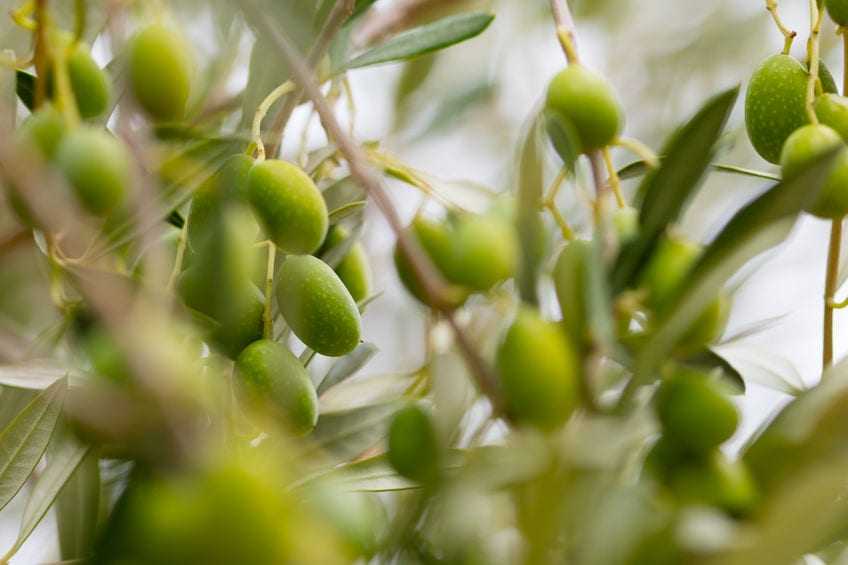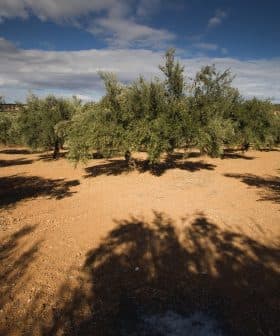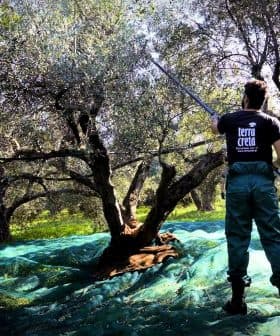Hot Weather Reduced Olive Oil Quality and Yield in Small Study

Researchers in Israel studied the impact of high temperatures on olive trees, finding that intense heat decreased the quantity and quality of olive oil, leading to reduced yield. The study suggests that further research could develop olive varieties resilient to high temperatures, securing farmers’ crops against unseasonable warm weather and climate change.
Researchers in Israel studied the effects of high environmental temperatures on olive trees, determining that intense heat reduced the quantity and quality of olive oil and ultimately led to a reduced yield. Further research could develop olive varieties resilient to high temperatures that would secure farmers’ crops against unseasonable warm weather and climate change.
Olive trees are known for their resilience to extreme weather variations. Global warming, however, has posed potentially great risks in many olive oil producing territories around the world where alternating waves of extremes extend beyond their normal weather patterns.
See Also:Unusual Spring Heat Brings Early Problems for Greek FarmsHigher-than-normal heat brings early blossoming. Colder days can freeze the blossoms and prevent flowering and fruit development. Productivity is diminished and the olive oil yield is reduced.
To test how the olive trees behave in hot weather, the researchers placed five-year-old potted trees of five different olive varieties in two locations: one with hot summers with temperatures often exceeding 40°C (104°F) and another with relatively mild summers with temperatures around 30°C (86°F).
The locations were specifically selected so the trees experienced temperatures beyond the fluctuations naturally occurring in their usual olive oil producing territories.
See Also:Unusual Weather Could Be Problematic for California Olive CropThe cultivars used were the Barnea, Coratina, Suri, Picholine and Koroneiki.
The experiment spanned two harvesting seasons and the trees were irrigated. Each month olive drupes were sampled from the trees to undergo histological and physiological analyses and an oil accumulation evaluation.
At the end of each season, a certain number of drupes from all five varieties were harvested and processed using a laboratory-scale centrifugal system.
The results showed that higher-than-usual temperatures affected the olive fruit growth and weight, the oil accumulation in the fruits and the oil composition. The effects were found to be genotype-dependent with each cultivar exhibiting different responses to periods of intense heat.
“In order to understand the mechanism of the sensitivity and the resistance of olive cultivars to high temperatures, we analyzed the transcriptome [the RNA transcripts], ” researcher Giora Ben-Ari told Olive Oil Times.
“We decoded the gene expression pattern of all genes involved in the olive oil biosynthesis. It seems like the main mechanism of high temperature environment resistant is the ability to delay fruit development and oil accumulation.”
In high temperatures, the trees of the Barnea and the Koroneiki cultivars delayed the development of the olive fruits until milder temperatures prevailed, while the olive fruit weight was reduced in all cultivars except the Barnea.
In terms of olive oil quantity, among the cultivars tested the Barnea exhibited stability against high environmental temperatures with fruit weight and content of olive oil almost identical in olive fruits sampled from both locations. The Koroneiki and the Suri cultivars were affected by warmer temperatures with fruit weight and olive oil accumulation diminishing in trees at the high temperature site compared to the trees at the moderate temperature site.
On the other hand, the quality of the olive oil deteriorated in all five cultivars in the high-temperature group. Oleic acid and polyphenol content in the drupes sampled from the high-temperature site measured lower than those sampled from the moderate-temperature site.
In conclusion, the Koroneiki cultivar appeared the most susceptible to hot environments in all analyzed parameters among the cultivars tested. The Coratina and the Picholine were also affected but managed to retain the amount of oil in the olive drupes when exposed to warmer temperatures, while the olive oil produced from the Souri cultivar retained to some extent its organoleptic characteristics. The Barnea cultivar exhibited some loss in the olive oil quality, but retained the concentration of oil and the weight of the olive fruits under heat.
Ben-Ari explained that apart from specifying which cultivars are better suited to deal with intense heat, another objective of their research is to create a ‘breeding program’ to develop new varieties that exhibit increased tolerance to higher temperatures.
“Future research will look at the gene expression in order to understand the differences between sensitive and resistant cultivars,” he said. “This will help in breeding programs to develop resistant cultivars. In addition, last year we planted 100 cultivars in both locations, and in the next several years we will screen these cultivars in order to identify the resistant ones.”
Their results should be treated cautiously due to the relatively short time period and limited sampling, the researchers noted. Nevertheless, it could pave the way for more research on the subject to yield useful data for growers facing increasing climatic extremes.









